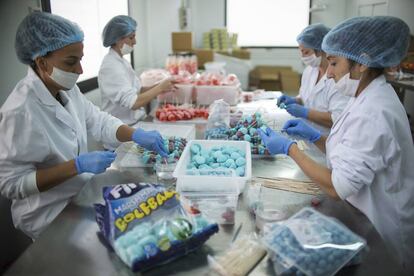Halal sweets prove to be a hit for Spanish company Wonkandy
Seville-based firm has carved out a market via world-famous stores such as Harrods

Andrés Pérez and Fátima Pereyra of Seville never lost hope. After the housing bubble burst in 2007 causing Spain’s economy to crash, Pérez was left unemployed. The real estate industry, to which he had dedicated 15 years of his life, had turned its back on him. Pereyra, with a long career in fashion design, saw lagging sales in clothing and wanted a way out of the hardship brought about by the economic crisis. In the midst of the storm, the couple decided to “turn the page and start a new chapter.”
They began looking for a business that would be profitable year round and that could appeal to people of all ages. After months of research, they finally found a way to sweeten their income: fruit candy. In 2010, they founded Wonkandy (“World of natural candies”), which now exports its products to 20 countries around the world and counts on turnover of €1.2 million.
We wanted a product in which the raw material was of the highest quality and all natural Andrés Pérez, Wonkandy
“We got into the business in a cold and calculating manner,” says Pérez. Their idea was to breathe new life into everyday candies. “We wanted an all-natural product made from the highest-quality ingredients, and one for which the packaging would play a prominent role.” Noting that the sweets industry had neglected a demand for more natural products, Pérez and Pereyra created an extensive catalog and established relationships with dozens of manufacturing companies.
In 2011, they opened their first store in Seville. “For the launch of the brand and the opening of our first location, we invested about €100,000.” But the nightmare of the economic crisis was not over yet. Between 2012 and 2013, when Spain’s GDP plummeted, Wonkandy had to look overseas to keep afloat.
Their first international store was established in Stockholm through franchising. “Investors became infatuated with the brand and wanted to bring it there… They started with a small kiosk,” Pérez explains. The foreign market began to give new impetus to the Seville-based company, which by 2014 had spread slowly across Spanish territory with outlets at public transport stations in Catalonia, Madrid, Asturias, Galicia and the Basque Country.
But its real promotion to the big leagues came in 2015, when London department store Harrods, which belongs to the Qatari royal family, began selling Wonkandy treats. “The entrance marked a before-and-after in our business,” says Pérez.
The sweets that came to the United Kingdom were different, however. The majority were aimed at the country’s Muslim population. “The jelly beans, instead of being made with pork gelatin, were made from cow or vegetable alternatives,” explains Pérez.
Currently, the company works with more than 400 candy producers and exports to 25 countries worldwide
Officially certified for the Islamic market by the Halal Institute of Córdoba, the products were then able to reach countries on the Persian Gulf. In 2015, local investors who had bought the franchising rights for Iraq, the United Arab Emirates, Kuwait, Bahrain and Oman, opened several stores in Saudi Arabia. This region provides 20% of the company’s profits.
“Our vocation is now international,” Pérez says. Currently, the company works with more than 400 candy producers, exports to 25 countries worldwide, and 60% of its revenue comes from sales abroad. Through Spanish department store chain El Corte Inglés, the company sells its candies across Spain. They have arrived in Italy thanks to Alcampo, in France through Galleries Lafayette, and in Germany through Berlin’s KaDeWe (Kaufhaus des Westens).
In Seville, they had two stores, but closed them to focus on franchising and distribution through large shopping centers. “Next year, we want to be in the Spanish stores of [French-owned supermarket] Carrefour,” says Pérez.
Additionally, the company hopes to increase sales by 40% by the end of this year and to continue expanding the sale of its products in Muslim countries. Annually, Wonkandy distributes almost 200 tons of candy across the world and has a catalog of more than 350 products. “We want to continue demonstrating that candy has a relevant value in the market – not just to be enjoyed by children, but by adults too.”
English version by Henry Hahn.
Tu suscripción se está usando en otro dispositivo
¿Quieres añadir otro usuario a tu suscripción?
Si continúas leyendo en este dispositivo, no se podrá leer en el otro.
FlechaTu suscripción se está usando en otro dispositivo y solo puedes acceder a EL PAÍS desde un dispositivo a la vez.
Si quieres compartir tu cuenta, cambia tu suscripción a la modalidad Premium, así podrás añadir otro usuario. Cada uno accederá con su propia cuenta de email, lo que os permitirá personalizar vuestra experiencia en EL PAÍS.
¿Tienes una suscripción de empresa? Accede aquí para contratar más cuentas.
En el caso de no saber quién está usando tu cuenta, te recomendamos cambiar tu contraseña aquí.
Si decides continuar compartiendo tu cuenta, este mensaje se mostrará en tu dispositivo y en el de la otra persona que está usando tu cuenta de forma indefinida, afectando a tu experiencia de lectura. Puedes consultar aquí los términos y condiciones de la suscripción digital.









































